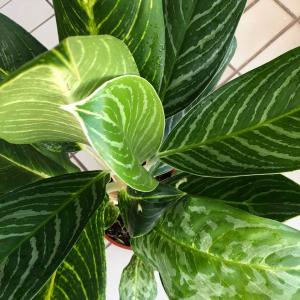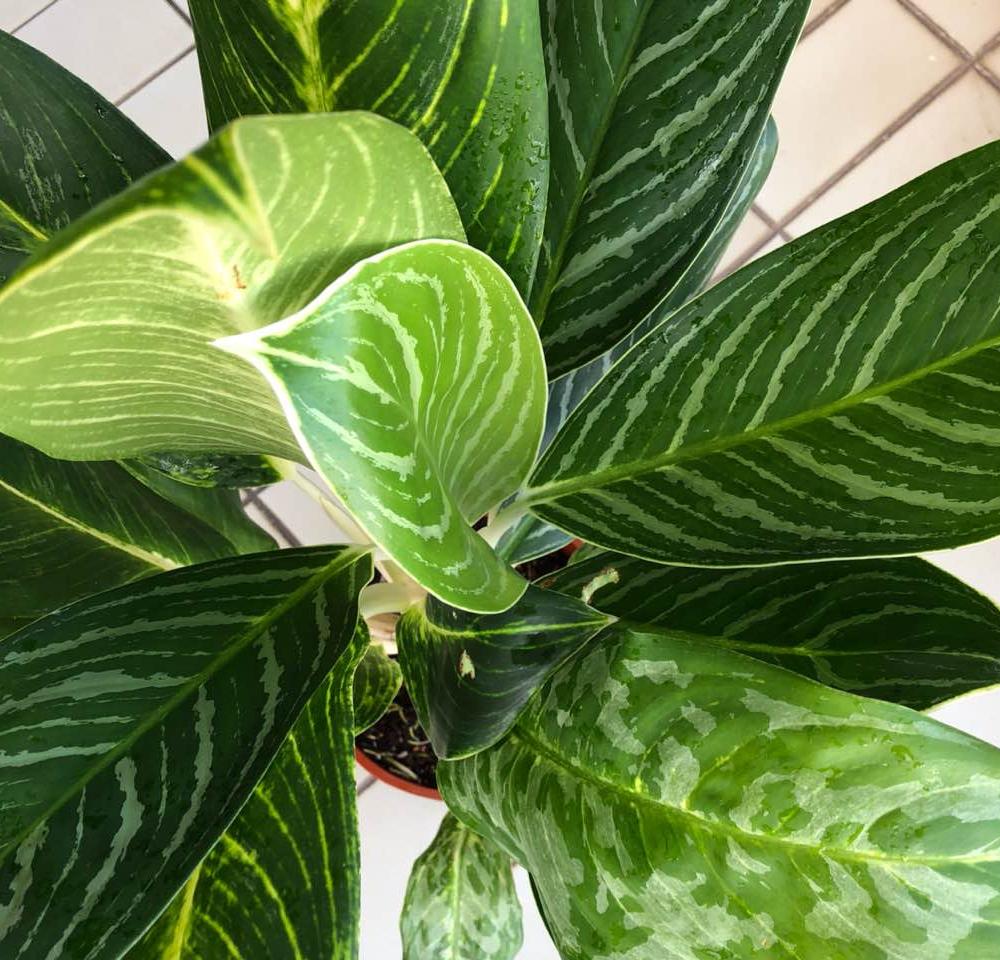植物经验
详细说明
The aglaonema (also called Chinese evergreen) is a highly decorative plant with several interesting varieties. It is one of the most popular houseplants and the color variations—from dark green to silver, and some with hints of red—can really add to your home's decor.
Aglaonemas are slow growing, attractive, and make excellent foliage plants. They have large, narrow, and glossy oval leaves on short stems.
Best of all, they really don't like full sun, so they're perfect for indoors, especially if window light is a commodity in your home.
There seems to be a little controversy over whether this plant is easy or difficult to grow. In general, it's easy if you follow one simple rule: the lighter the variegation, the more light it needs. Once you understand how that applies to your aglaonema, you should have no problems. It's a great choice for anyone who wants a plant that is easy to maintain and delivers brilliant foliage.
Growing Conditions
Light: The darker green varieties of aglaonema can grow in near shade, while the variegated varieties require brighter light. Do not expose any aglaonema to direct sun.
Water: Water thoroughly in the summer and mist the plant often to raise the humidity. During the winter, reduce watering but do not let the plant dry out completely.
Temperature: These plants do not like cold drafts or temperatures below 65 F.
Be sure to keep them away from drafty windows or vents and the warmer the spot you can find for them, the better.
Soil: A well-drained potting soil is perfect.
Fertilizer: Feed your aglaonema with slow-release pellets or a liquid fertilizer during the growing season.
Propagation
Aglaonemas are not typically propagated by home growers.
You can, however, divide the plants during repotting. Small shoots can also be potted as individual plants.
Repotting
Aglaonemas are slow growing and will only need repotting every other year. They are also generally low-growing plants, so their trunks will be revealed very gradually.
Varieties
Aglaonemas have been hybridized to produce interesting variegated leaves. The A. commutatum is widely available, in both the Silver Spear (variegated) form and a green form. A pure green A. modestum is seen more rarely. Other variegated forms include A. pictum, A. silver queen (almost totally silver), and A. pseudobracteatum.
Beware of the fruit of the A. crispum, which are toxic. It's best to avoid this variety if you have children or pets who may be curious about their tiny red fruits.
Grower's Tips
Because of their high humidity requirements, some growers consider aglaonema to be greenhouse plants. It's true that they will do best in the warm, humid, and bright environment of a greenhouse, but they can successfully be grown indoors by coming as close as possible to these conditions.
The number one rule to remember with aglaonema is this: keep them warm and moist. If you do this, you'll be rewarded with a long-lasting, stable houseplant that will not outgrow its pot anytime soon.
It really is a great choice if you struggle with houseplants but want some colorful foliage around the house.
Aglaonemas are slow growing, attractive, and make excellent foliage plants. They have large, narrow, and glossy oval leaves on short stems.
Best of all, they really don't like full sun, so they're perfect for indoors, especially if window light is a commodity in your home.
There seems to be a little controversy over whether this plant is easy or difficult to grow. In general, it's easy if you follow one simple rule: the lighter the variegation, the more light it needs. Once you understand how that applies to your aglaonema, you should have no problems. It's a great choice for anyone who wants a plant that is easy to maintain and delivers brilliant foliage.
Growing Conditions
Light: The darker green varieties of aglaonema can grow in near shade, while the variegated varieties require brighter light. Do not expose any aglaonema to direct sun.
Water: Water thoroughly in the summer and mist the plant often to raise the humidity. During the winter, reduce watering but do not let the plant dry out completely.
Temperature: These plants do not like cold drafts or temperatures below 65 F.
Be sure to keep them away from drafty windows or vents and the warmer the spot you can find for them, the better.
Soil: A well-drained potting soil is perfect.
Fertilizer: Feed your aglaonema with slow-release pellets or a liquid fertilizer during the growing season.
Propagation
Aglaonemas are not typically propagated by home growers.
You can, however, divide the plants during repotting. Small shoots can also be potted as individual plants.
Repotting
Aglaonemas are slow growing and will only need repotting every other year. They are also generally low-growing plants, so their trunks will be revealed very gradually.
Varieties
Aglaonemas have been hybridized to produce interesting variegated leaves. The A. commutatum is widely available, in both the Silver Spear (variegated) form and a green form. A pure green A. modestum is seen more rarely. Other variegated forms include A. pictum, A. silver queen (almost totally silver), and A. pseudobracteatum.
Beware of the fruit of the A. crispum, which are toxic. It's best to avoid this variety if you have children or pets who may be curious about their tiny red fruits.
Grower's Tips
Because of their high humidity requirements, some growers consider aglaonema to be greenhouse plants. It's true that they will do best in the warm, humid, and bright environment of a greenhouse, but they can successfully be grown indoors by coming as close as possible to these conditions.
The number one rule to remember with aglaonema is this: keep them warm and moist. If you do this, you'll be rewarded with a long-lasting, stable houseplant that will not outgrow its pot anytime soon.
It really is a great choice if you struggle with houseplants but want some colorful foliage around the house.
花相册 (7)
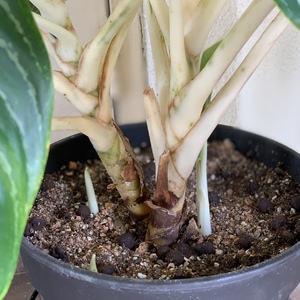
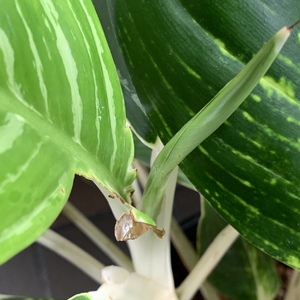
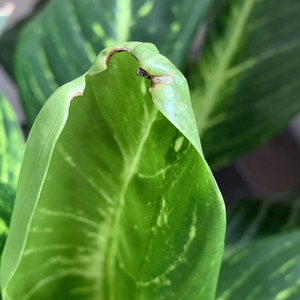
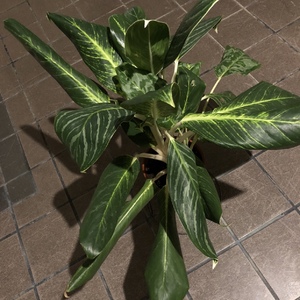
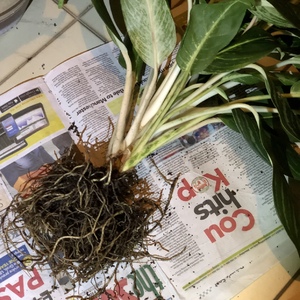
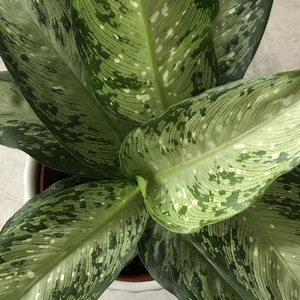
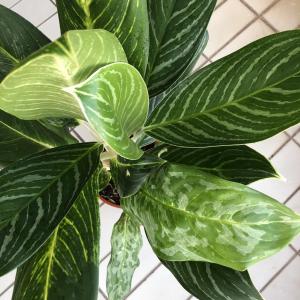
kensong
2019年02月01日

New shoots after repotting.


kensong
2019年01月05日

No idea why some new leaves looked burnt.




kensong
2018年08月01日

Repotted my Aglaonema (Chinese Evergreen) because it's leaves are curling and it may be because soil too wet.




kensong
2018年08月01日

Added a new Aglaonema.


kensong
2018年04月16日

This is my first growing diary.
